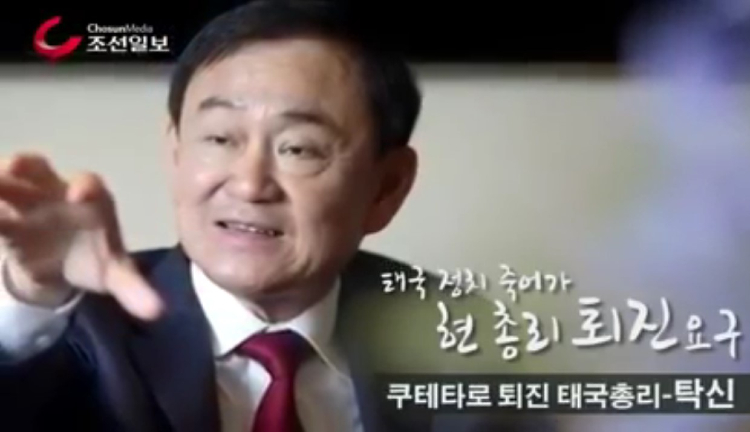
The Office of the Attorney General confirmed today that former prime minister Thaksin Shinawatra will be indicted for lèse-majesté and violation of the Computer Crime Act, in relation to an interview he gave in South Korea almost a decade ago: speaking to The Chosun Daily (조선일보), he implied that a “palace circle” was behind the 2014 coup. An OAG spokesman said this morning: “The attorney general has decided to indict Thaksin on all charges”. Thaksin was not present to answer those charges, as he tested positive for coronavirus yesterday. His hearing has been postponed until 18th June.
Thaksin’s passports were revoked by the Ministry of Foreign Affairs on 27th May 2015, in a preemptive decision pending a police investigation into the Chosun Daily video. Two days later, lèse-majesté charges were filed against Thaksin on behalf of Udomdej Sitabutr, army chief at the time (raising questions about the politicisation of the military). After Thaksin was indicted today, his lawyer Winyat Chartmontri said: “Thaksin is ready to prove his innocence in the justice system.” That stance may change if the case goes to trial, as those accused of lèse-majesté almost always enter guilty pleas. (Defendants pleading guilty often receive reduced sentences.)
When Thaksin returned from self-imposed exile on 22nd August 2023, it seemed that he and the military had reached a mutually beneficial truce. However, the military giveth and taketh away: Thaksin has been wrong-footed several times, and every act of leniency granted to him has come with strings attached. He was released on parole on 18th February, yet the very next day he appeared at the OAG (in a wheelchair) after the Chosun Daily case was suddenly revived. His application for a royal pardon was accepted, though it only partially commuted his prison sentence. Senators endorsed Srettha Thavisin, the leader of his proxy party, as Prime Minister, though a group of forty senators has now petitioned the Constitutional Court to investigate Srettha.
Srettha is accused of violating article 160 of the constitution by appointing Pichit Chuenban, Thaksin’s disgraced former lawyer, as Prime Minister’s Office Minister. Pichit was jailed for six months in 2008 after blatantly attempting to bribe a judge on Thaksin’s behalf with ฿2 million in cash. Article 160 states that government ministers must “not have behaviour which is a serious violation of or failure to comply with ethical standards”, which would seem to apply in Pichit’s case.
The court accepted the petition against Srettha on 23rd May. With both Thaksin and Srettha now under investigation, it seems clear that a warning message (at the very least) is being sent, reminding Thaksin that his deal with the military was not made on equal terms. Thaksin upheld his side of the Faustian pact when his proxy party Pheu Thai prevented the anti-military Move Forward Party from forming a government, but Move Forward is now facing the prospect of dissolution by the Constitutional Court. This would be a more effective neutralisation of MFP, and could be achieved without Thaksin, who may therefore become surplus to the military’s requirements.
Thaksin’s passports were revoked by the Ministry of Foreign Affairs on 27th May 2015, in a preemptive decision pending a police investigation into the Chosun Daily video. Two days later, lèse-majesté charges were filed against Thaksin on behalf of Udomdej Sitabutr, army chief at the time (raising questions about the politicisation of the military). After Thaksin was indicted today, his lawyer Winyat Chartmontri said: “Thaksin is ready to prove his innocence in the justice system.” That stance may change if the case goes to trial, as those accused of lèse-majesté almost always enter guilty pleas. (Defendants pleading guilty often receive reduced sentences.)
When Thaksin returned from self-imposed exile on 22nd August 2023, it seemed that he and the military had reached a mutually beneficial truce. However, the military giveth and taketh away: Thaksin has been wrong-footed several times, and every act of leniency granted to him has come with strings attached. He was released on parole on 18th February, yet the very next day he appeared at the OAG (in a wheelchair) after the Chosun Daily case was suddenly revived. His application for a royal pardon was accepted, though it only partially commuted his prison sentence. Senators endorsed Srettha Thavisin, the leader of his proxy party, as Prime Minister, though a group of forty senators has now petitioned the Constitutional Court to investigate Srettha.
Srettha is accused of violating article 160 of the constitution by appointing Pichit Chuenban, Thaksin’s disgraced former lawyer, as Prime Minister’s Office Minister. Pichit was jailed for six months in 2008 after blatantly attempting to bribe a judge on Thaksin’s behalf with ฿2 million in cash. Article 160 states that government ministers must “not have behaviour which is a serious violation of or failure to comply with ethical standards”, which would seem to apply in Pichit’s case.
The court accepted the petition against Srettha on 23rd May. With both Thaksin and Srettha now under investigation, it seems clear that a warning message (at the very least) is being sent, reminding Thaksin that his deal with the military was not made on equal terms. Thaksin upheld his side of the Faustian pact when his proxy party Pheu Thai prevented the anti-military Move Forward Party from forming a government, but Move Forward is now facing the prospect of dissolution by the Constitutional Court. This would be a more effective neutralisation of MFP, and could be achieved without Thaksin, who may therefore become surplus to the military’s requirements.
